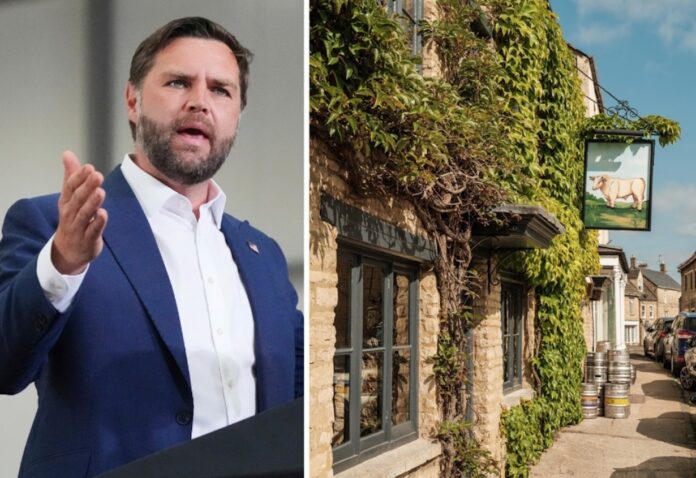- Staff at The Bull pub in Charlbury, Oxfordshire, reportedly refused to serve JD Vance due to political objections.
- The incident followed a recent visit by Kamala Harris, which went smoothly, highlighting contrasting reactions.
- The refusal sparked media attention, public debate, and discussions about politics intersecting with hospitality.
In a quiet corner of Oxfordshire, a centuries-old pub found itself at the center of an unexpected political drama. The Bull, a charming 16th-century inn in Charlbury, known for its cozy atmosphere and award-winning cuisine, reportedly turned away U.S. Vice President JD Vance after a staff revolt.
A Historic Pub Faces an Unusual Challenge
The Bull has long been celebrated for its Michelin Bib Gourmand status, recognizing exceptional food at reasonable prices. Locals and visitors alike praise the pub for its warm interiors, ivy-covered walls, and attentive service. Yet, in August, the inn became the focus of international attention—not for its menu, but for politics.
According to reports, Vance had tried to secure a dinner reservation at The Bull. However, employees reportedly threatened to refuse to work if management accepted his booking. The resulting standoff left the management with little choice but to turn away the Vice President, sparking a wave of media coverage and public discussion.
The incident is particularly striking given the pub’s recent high-profile clientele. Just weeks prior, The Bull hosted former Vice President Kamala Harris for a pre-wedding dinner for Eve Jobs, daughter of the late Steve Jobs, who married British Olympic equestrian Harry Charles. While Harris’s visit went off without incident, Vance’s attempt to dine at the same venue ended in refusal, highlighting the growing influence of political divisions even in tranquil countryside settings.
Staff Take a Stand
Sources suggest the staff’s refusal stemmed from strong objections to Vance’s political positions. The protest reflects a broader trend in which individuals in service industries are increasingly willing to act on personal beliefs, even when it involves high-profile figures.
For the management, this created a delicate balancing act. The Bull’s reputation relies heavily on both its quality of service and its neutrality as a gathering place. The staff’s firm stance left management in a tough position: accommodate a controversial political figure and risk losing employees, or support the staff and risk media backlash. They ultimately chose the latter.
Public Reaction and Social Media Buzz
News of the refusal quickly spread, igniting a flurry of reactions on social media. Some applauded the staff for standing by their convictions, calling it a bold act of principle. Others criticized the decision, arguing that public establishments should remain neutral and accommodate guests regardless of politics.
Locals in Charlbury expressed mixed feelings. While some residents appreciated the staff’s activism, others worried that such incidents could make the village a hotspot for political tension. Online forums lit up with debates, reflecting the polarized nature of modern political discourse.
The Wider Implications
This episode at The Bull underscores the challenges faced by businesses when politics and public service intersect. Staff members are increasingly vocal about their beliefs, and their willingness to act on them can directly influence operational decisions. For pubs, restaurants, and other hospitality venues, this trend introduces new complexities in managing both staff and clientele.
Observers note that the Cotswolds, known for its picturesque landscapes and quiet charm, may not remain untouched by political divisions. As more high-profile figures visit rural Britain, establishments like The Bull could increasingly find themselves navigating sensitive situations where hospitality and personal conviction collide.
A Quiet Village in the Spotlight
Charlbury, a village once known primarily for its scenic walks and historic architecture, suddenly found itself thrust into international news. While Vance left without a meal, the story of the staff refusal has sparked wider conversations about political expression, workplace solidarity, and the role of businesses in taking a stand.
For The Bull, the summer’s events have brought both attention and scrutiny. Locals hope the incident remains a brief headline rather than a lasting source of tension. Meanwhile, the pub continues to welcome visitors—just perhaps not everyone.




